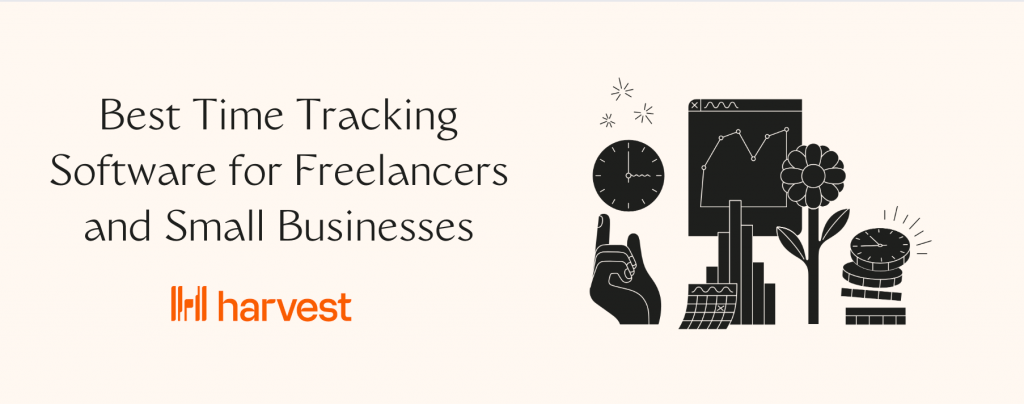
Picture yourself as the choreographer of a complex dance performance, where each dancer embodies a task or project in your professional life. You have all these skilled performers executing intricate moves, but without an accurate way to monitor time, it’s akin to directing without music or a stopwatch.
Just as a choreographer relies on music and timing to synchronize dancers and ensure fluidity, freelancers and small business owners need dependable time tracking software to maintain their work’s tempo. This digital metronome assists you in staying organized, monitoring progress, and ensuring every task is accomplished promptly.
Lacking this tool results in a chaotic ballet of missed deadlines, overlooked billable hours, and relentless efforts to balance multiple projects. As a small business owner or freelancer, we understand that operating like a ‘little big business’ isn’t practical; instead, you need agile solutions tailored to your specific needs with flexibility and adaptability.
This guide delves deep into the realm of time tracking software for freelancers and small businesses while providing insights on selecting the right one for your venture. So let’s leap into the world of top-notch time tracking software solutions that will empower you to master the art of effective time management effortlessly.
Why use time tracking software?

Managing time effectively is a fundamental challenge for freelancers and small businesses alike. Without a reliable system in place, it’s easy to lose track of how much time is spent on different tasks or projects.
This can lead to inaccurate billing, missed deadlines, and a general lack of productivity. That’s where time tracking solutions come to the rescue.
With a time tracking app, you gain a wide range of benefits that can significantly impact your professional life:
- Accurate billing: With time tracking software, you can effortlessly track your billable hours and ensure accurate invoicing —no more manually jotting down a weekly timesheet or relying on guesswork. The software keeps a precise record of the time you spend on each task, project, or client, eliminating errors and ensuring you get paid for every minute you’ve worked.
- Streamlined time entry: Time tracking software simplifies the process of entering your hours. Instead of spending valuable time manually recording your work hours, you can use the software’s intuitive interface to log your employee time with just a few clicks. This saves you from the hassle of paperwork and allows you to focus more on your actual work.
- Efficient project management: Tracking time goes beyond just billing. It helps you gain insights into how you allocate your time across different projects. Time tracking tools allow you to monitor the progress of your projects, identify areas where you might be spending too much or too little time, and make informed adjustments to optimize your workflow and meet deadlines.
- Improved productivity: By tracking your time, you gain a better understanding of how you utilize your work hours. You can identify time-wasting activities, distractions, or bottlenecks that hinder your productivity. Armed with this knowledge, you can make necessary adjustments, implement effective time management strategies, and increase your productivity levels, resulting in a positive workplace culture.
- Data-driven decision making: Time tracking software provides you with valuable data and reports that offer insights into your work patterns, project profitability, and resource allocation. This data allows you to make informed decisions about your business, such as identifying which projects or clients yield the highest returns, determining where to invest your time and resources, and optimizing your business strategy accordingly.
- Collaboration and transparency: If you work with an entire team or have multiple clients, time tracking software promotes collaboration and transparency. You can easily share project timelines, track team members’ contributions, and provide clients with detailed reports on the time spent on their projects. This fosters trust, enhances communication, and ensures everyone is on the same page regarding project progress and billing.
- Compliance and legal requirements: In some industries, accurate time tracking is not just a matter of good practice; it’s a legal requirement. Time tracking software helps you stay compliant with labor laws, regulations, and contractual obligations. It provides a reliable record of the hours worked, which can be crucial for audits, client disputes, or legal matters that may arise.
In the freelance and small business world, time tracking software can be a game-changer. It simplifies the process, ensures accuracy, and provides valuable insights that can boost your productivity, profitability, and client satisfaction.
What makes a great time tracking software

The best time tracking software stretches beyond the basic functionality of tracking tasks in real-time effectively, providing a range of features to enhance your efficiency and productivity.
Let’s explore some key elements that make a time tracking software stand out:
- Intuitive user interface: Ideally, time tracking software should have a user-friendly interface that is easy to navigate and understand. It should allow you to effortlessly log your time, switch between projects or tasks, and make adjustments as needed. The software should prioritize simplicity and clarity, ensuring that you can start tracking your time without any steep learning curve.
- Flexible time tracking options: Different projects and tasks may require different time tracking methods. It offers flexibility in capturing time, allowing you to choose between manual entry, timer-based tracking, or even automated tracking through integrations with other tools. This flexibility ensures that you can track your time accurately, regardless of the nature of your work.
- Advanced features: Look for a time tracking software that offers powerful features to elevate your time management. This may include features like project and task categorization, tags or labels for better organization, and the ability to set priorities or deadlines. Advanced features such as automatic idle time detection, reminders, and calendar integrations can also help you optimize your time tracking and ensure no billable hours slip through the cracks.
- Visual reports: Your time data can be analyzed more effectively with visual reports. These reports give you a bird’s-eye view of your time allocation, project progress, and productivity trends, enabling you to identify patterns, bottlenecks, and opportunities for improvement.
- Integration capabilities: Seamless integration with other tools and software is crucial for reliable time tracking software. It should be able to sync with your project management, invoicing, and accounting tools, eliminating the need for manual data entry and ensuring a seamless workflow. Integration capabilities allow for efficient time tracking and provide a holistic view of your projects, finances, and productivity.
- Team management: If you work with a team, the right time tracking app offers collaboration features that allow you to manage and monitor your team’s time. This includes assigning tasks, tracking individual and team progress, and generating team-wide reports. Collaboration features foster transparency, streamline communication, and ensure everyone is on the same page regarding project timelines and resource allocation.
Ultimately, time tracking software helps you make more informed decisions, optimize your time, and increase your efficiency. So, before choosing one, look for these elements that elevate it from good to great, ensuring it meets your specific needs and helps you take control of your time.
Types of time tracking software
A variety of time tracking software is available to suit different work cultures.
One type is desktop-based time tracking software, which is installed directly on your computer or laptop. A desktop app operates offline, allowing you to track time even without an internet connection.
Desktop-based solutions often provide robust features and offer a higher level of customization, making them suitable for individuals or businesses that prioritize security and have specific requirements or restrictions on cloud-based solutions.
Another type is web-based time tracking software, which operates through a web browser and is accessed online. A web app allows you to manage your time from anywhere with an internet connection, making it highly convenient and accessible.
Web-based solutions typically provide real-time syncing across devices, ensuring that your time data is up-to-date and accessible on different platforms. They are ideal for freelancers and businesses looking for flexibility and the ability to track time on the go.
Mobile apps for time tracking have also gained popularity in recent years. These apps enable you to track your time directly from your smartphone or tablet. Mobile time tracking apps can also bring the convenience of tracking time on the move, making them particularly suitable for any single user who frequently works outside the office or small businesses with remote teams.
Time tracking apps often come with additional features, such as GPS tracking, enabling location-based time tracking, and seamlessly integrating with other mobile productivity tools.
Each type of time tracking software offers its own advantages, so the choice depends on your specific needs and preferences.
Whether you prioritize offline functionality and customization (desktop-based), flexibility and real-time syncing (web-based), or mobility and convenience (mobile apps), there’s a type of time tracking software available to meet your unique requirements that helps you efficiently track and manage your time.
Tips for Effective Time Tracking
With numerous tasks to juggle and deadlines to meet, it’s essential to have a well-defined time management strategy in place. By tracking your time accurately, you can gain valuable insights, optimize productivity, and ensure that you’re making the most of your available hours.
To optimize your work hours, here are some tips that can help you track your time more effectively. These tips will help you maximize the benefits of using time tracking software and develop a disciplined approach toward managing your time.
Here are time tracking tips to consider:
- Set Clear Goals and Priorities: Before you start tracking your time, be sure to establish clear goals and prioritize your tasks. Determine what needs to be accomplished and allocate specific time slots for each task. This will help you stay focused and ensure that you’re dedicating sufficient time to essential activities.
- Choose the Right Time Tracking Software: Selecting the appropriate time tracking software is paramount. Consider factors such as ease of use, compatibility with your devices, reporting capabilities, and integration options with other tools you use. The software should align with your specific needs and provide a seamless experience for accurate time tracking.
- Consistently Track Your Time: Make it a habit to consistently track your time for all tasks and projects. Set reminders or use automated features within the time tracking software to prompt you to start and stop timers. Consistent tracking will provide you with accurate data to evaluate your productivity and make informed decisions.
- Categorize and Label Tasks: Organize your tasks by categorizing and labeling them appropriately. This can be done within the time tracking software itself. By assigning categories or labels, you can easily identify the type of work you’re doing and analyze how time is allocated across different activities.
- Analyze and Review Time Reports: Regularly review the time reports generated by your tracking software. Look for patterns, identify time-consuming activities, and assess how well you’re adhering to your planned schedule. Use these insights to make adjustments, streamline processes, and improve your time management practices.
- Set Realistic Time Estimates: When assigning time estimates to tasks, be realistic and consider potential interruptions or unforeseen challenges. It’s better to allocate slightly more time than you think you’ll need, as this will prevent unnecessary stress and help you maintain a more realistic schedule.
- Schedule Breaks and Downtime: Remember to incorporate breaks and downtime into your time management strategy. Allowing yourself moments of rest and rejuvenation can boost productivity and prevent burnout. Schedule short breaks throughout the day and allocate time for activities that help you relax and recharge.
- Adjust as Needed: Everyone’s work style is different, so it’s important to experiment with different time management techniques and adjust your approach as needed. Pay attention to what works best for you and adapt your time tracking and management strategies accordingly.
By implementing these tips, you can establish effective time tracking habits, optimize your productivity, and achieve a better work-life balance.
A well-executed time management strategy, supported by reliable time tracking software, will empower you to make the most of your time and propel your freelancing or small business endeavors to new heights.
Empower your time management with the right time tracking software
Effective time management is the key to success, regardless of the business size. It’s also no secret that tracking your time accurately and efficiently is crucial for staying on top of projects, meeting deadlines, and maximizing productivity.
So, when it comes to finding the right time tracking software for freelancers and small businesses, you can’t go wrong with Harvest.
Harvest offers a comprehensive time tracking solution for everyone. With our intuitive interface and powerful features, Harvest empowers you to effortlessly record your time and ensure that you’re making the most of every second.
Don’t let the stress of time management hold you back. Get in touch with Harvest today, and let us show you how time tracking can revolutionize your workflow.



